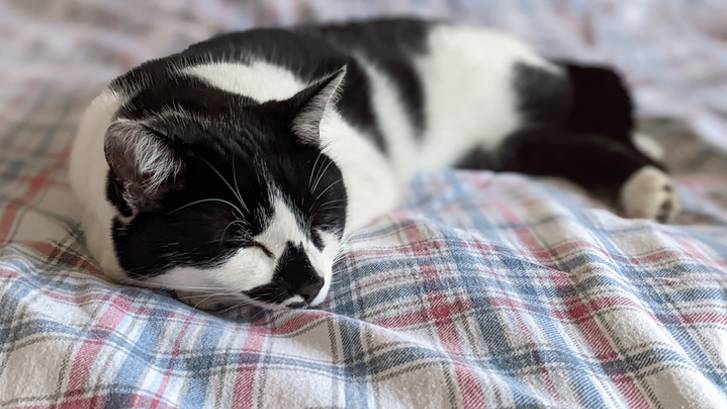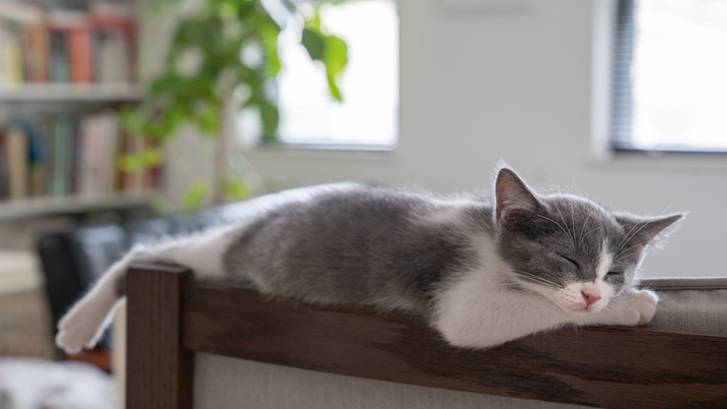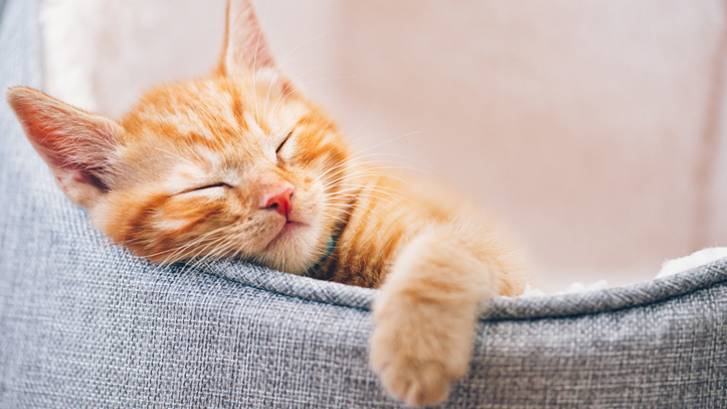Can cats sleep with their eyes open and is it normal?
Does your cat still stare at you even while he’s asleep? Don’t worry, this is normal – learn more about this behavior below!

Have you ever noticed that your cat sleeps with their eyes open? This can be startling to see, especially the first time your cat does it. You may be wondering whether your cat is okay or whether you should attempt to wake him up.
The good news is that sleeping with the eyes open is a normal behavior and is rarely a cause for concern. Our feline friends are well known for their ability to sleep. In fact, cats spend more than half the day asleep! Whether it’s curled up on your favorite arm chair or stretched out across a patch of sunlight, if you’re a cat owner, you’ve probably found your cat sleeping in all kinds of ways.
During sleep cats may have their eyes open, twitch, move their limbs, or even act like they’re stalking and hunting. This is all totally normal – as long as it is not excessive.
Read on to learn more about the normal phases of sleep in cats and when to worry about your cat’s sleeping behavior.
- Best cat bed: Cozy cribs for a perfect rest
- Are cats nocturnal? How to get a cat to sleep at night
- Should you let a cat sleep on your bed?
Cat sleep physiology
As you’ve probably noticed, your cat has a much different sleeping pattern compared to you or even other pets in your household. Cats are famous for their ability to sleep all day! In reality, cats sleep about 13 hours a day, broken into sessions of approximately 78 minutes at a time.
Like us humans, cats experience both REM sleep (rapid eye movement sleep) and non-REM sleep. During non-REM sleep, the cat is immobile and they eyes do not move. During REM sleep, the cat is generally still immobile but may have bursts of movement as they dream. This can include movement of the eyes, tail, limbs, and diaphragm.

Is It normal for cats to sleep with their eyes open?
Like humans, dogs, and other animals, cats can sometimes sleep with their eyes open. This can occur because we are immobile during non-REM sleep and our eyes do not move. This can be a normal occurrence for some cats and typically is not any cause for concern.
Get the best advice, tips and top tech for your beloved Pets
Cats may also sleep with their eyes open following the use of certain sedatives or anesthetic medications in the veterinary clinic. If these medications have not fully worn off by the time your cat goes home with you, it’s possible that you may see your cat sleeping with its eyes open for a little while at home until the medication completely wears off. This is not any cause for concern and will resolve once your cat is no longer under the influence of the medication.
What does it mean if my cat twitches during sleep?

Non- REM sleep
Cats may twitch, like humans, dogs, and other animals, cats can sometimes sleep with their eyes open. This can occur because we are immobile during non-REM sleep and our eyes do not move. This can be a normal occurrence for some cats and typically is not any cause for concern.
Medications
Cats may also sleep with their eyes open following the use of certain sedatives or anesthetic medications in the veterinary clinic. If these medications have not fully worn off by the time your cat goes home with you, it’s possible that you may see your cat sleeping with its eyes open for a little while at home until the medication completely wears off. This is not any cause for concern and will resolve once your cat is no longer under the influence of the medication,
REM stage of sleep
You might notice your cat act out stalking and other predatory behaviors in their sleep. This occurs during the REM stage of sleep, when the cat is dreaming. You may also see your cat’s eyes and whiskers twitch, sometimes vigorously. This is no cause for concern.
Your cat is simply dreaming about all the mice he would like to catch! Cats have dreams just like humans and dogs do, and they may have bursts of movement during sleep as their body acts out those dreams.
This is normal and is not typically a problem for you or your cat. Twitching in sleep only becomes a problem if the motion is violent, constant, or does not stop when you try to wake your cat up. This type of abnormal twitching may be a sign of a seizure or a sleep disorder.
Sleep disorders in the cat
Sleep disorders are very rare in cats, but they are still possible. A REM Sleep Disorder occurs when a cat has excessive, violent movement of the limbs during REM sleep, often accompanied by excessive vocalization and biting or chewing behavior. The cat may even become a danger to himself or others. This behavior differs from a seizure because the behavior stops as soon as the cat is roused from sleep, and the cat quickly goes back to normal.
If you suspect your cat may have a sleep disorder, try to take some videos of your cat sleeping, especially when the abnormal behavior is occurring. These videos will greatly help your veterinarian diagnose the problem. Your veterinarian will review the videos, take a thorough history, and perform a full head to tail physical examination. Your vet may also recommend blood tests or x-rays to rule out other potential causes of the behavior.
The good news is that in most cases, an REM sleep disorder is not harmful to the cat. It is not progressive and does not cause any other illnesses or effects on the cat’s brain. The most important thing is keeping the cat safe during sleep so he does not accidentally injure himself. Keeping an affected cat in a crate during naps and at bedtime can help. Your veterinarian can also try prescribing medication to try to alleviate the movement during sleep, but this has had limited success in previous cases of REM sleep disorder.

Conclusion
Although sleeping disorders in the cat do exist, they are very rare. A cat sleeping with its eyes open is generally no cause for concern as long as the cat is otherwise sleeping normally.
There is no need to wake the cat or to try to close its eyes – simply leaving the cat alone to finish its nap is perfectly fine. Similarly, minor twitching or movement during sleep is normal as cats experience dreams similar to dogs and us humans. There’s no need to wake the cat as long as the twitching is not violent or excessive. Sweet dreams, kitty!
Dr. Elizabeth Racine is a small animal general practice vet covering all things pet health and wellness. Her special interests include veterinary behavior, nutrition, and internal medicine.
As a freelance writer, Dr. Racine has written content for major companies in the industry such as the American Kennel Club, Merck Animal Health, Bayer PetBasics, Elanco, and CareCredit. In her free time, Dr. Racine enjoys playing trampoline dodgeball, hiking with her beagle Dasher, and spending time with her three mischievous cats.

